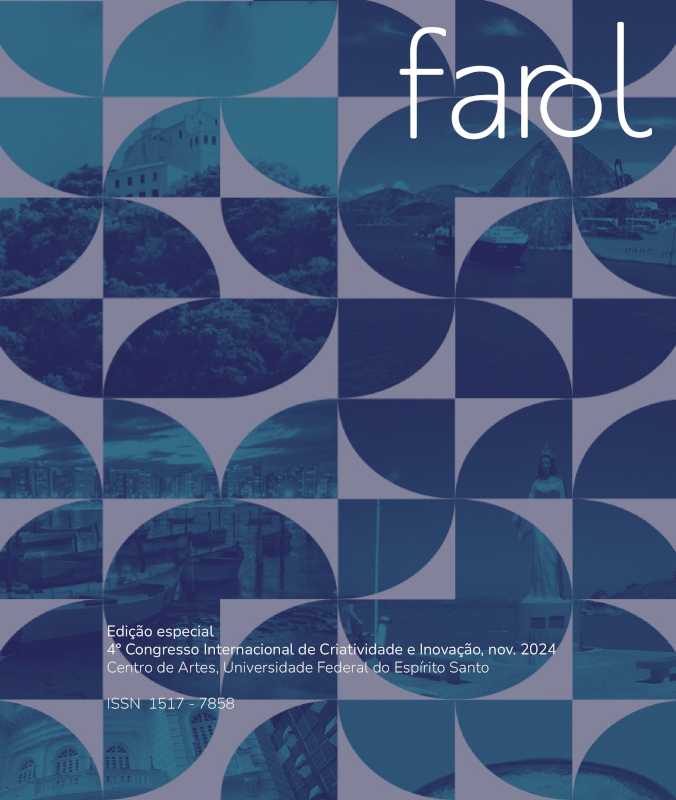Por entre os labirintos da Ética
a Criatividade como catalisadora da reflexão ética em contextos educativos
Palavras-chave:
criatividade, ética, educação, desafio, agência pessoal e coletivaResumo
Num mundo em transformação, os desafios éticos enfrentados pela sociedade contemporânea tornaram-se cada vez mais complexos. Além das tensões geopolíticas, das alterações climáticas e das questões sociais levantadas pelas migrações, há ainda que se considerar o impacto da revolução tecnológica nas desigualdades sociais. Em tempos de incerteza, a criatividade é fundamental na construção de soluções inovadoras e na análise crítica dos dilemas éticos subjacentes, principalmente em contextos educativos nos quais é urgente promover a agência pessoal e coletiva dos educadores, por meio de uma reflexão ética. Este artigo reflete sobre a importância de uma perspetiva ética da criatividade e discute estratégias psicológicas e educativas que podem facilitar a sua exploração, com vista à construção de uma sociedade mais justa e equitativa.
Downloads
Referências
Amabile, T. M. (2018). Creativity and the Labor of Love. In R. J. Sternberg & J. C. Kaufman (Eds.), The Nature of Human Creativity (1st ed., pp. 1–15). Cambridge University Press. https://doi.org/10.1017/9781108185936.003
Bandura, A. (2018). Toward a Psychology of Human Agency: Pathways and Reflections. Perspectives on Psychological Science, 13(2), 130–136. https://doi.org/10.1177/1745691617699280
Batson, C. D. (2016). What’s wrong with morality? A social-psychological perspective. Oxford University Press.
Beghetto, R. A. (2019). Beautiful risks: Having the courage to teach and learn creatively. Rowman & Littlefield.
Beghetto, R. A., & Kaufman, J. C. (2014). Classroom contexts for creativity. High Ability Studies, 25(1), 53–69. https://doi.org/10.1080/13598139.2014.905247
Betts, A., & Collier, P. (2017). Refuge: Rethinking refugee policy in a changing world. Oxford University Press.
Boden, M. (2018). Creativity and biology. In B. N. Gaut (Ed.), Creativity and philosophy (1 [edition]). Routledge.
Brynjolfsson, E., & McAfee, A. (2014). The second machine age: Work, progress, and prosperity in a time of brilliant technologies. W W Norton & Co.
Campos, B. P., & Coimbra, J. L. (1991). Consulta Psicológica e Exploração do Investimento Vocacional. Cadernos de Consulta Psicológica, 7, 11–19.
Ciuriak, D. (2023, July 19). The Digital Revolution Has Transformed Geopolitics. Www.Cigionline.Org. https://www.cigionline.org/articles/the-digital-revolution-has-transformed-geopolitics/
Craft, A. (2002). Creativity and Early Years Education. Continuum.
Craft, A. (2011). Creativity and education futures: Learning in a digital age. Trentham Books.
Eubanks, V. (2019). Automating inequality: How high-tech tools profile, police, and punish the poor (First Picador edition). Picador St. Martin’s Press.
Flood, M., & Phillips, K. D. (2007). CREATIVITY IN OLDER ADULTS: A PLETHORA OF POSSIBILITIES. Issues in Mental Health Nursing, 28(4), 389–411. https://doi.org/10.1080/01612840701252956
Freire, P. (1970). Pedagogia do Oprimido. Paz e Terra.
Glăveanu, V. P. (2017). A Culture‐Inclusive, Socially Engaged Agenda for Creativity Research. The Journal of Creative Behavior, 51(4), 338–340. https://doi.org/10.1002/jocb.198
Glăveanu, V. P. (2020). The Possible: A Theory. Oxford University Press.
Goodman, N. (1978). Ways of worldmaking. Hackett Publishing.
Hennessey, B. A. (2019). Motivation and Creativity. The Cambridge Handbook of Creativity, 374–395. https://doi.org/10.1017/9781316979839.020
Hooks, B. (2019). Erguer a voz: Pensar como feminista, pensar como negra. Editora Elefante.
Kapoor, H., & Kaufman, J. C. (2022). Unbound: The Relationship Among Creativity, Moral Foundations, and Dark Personality. The Journal of Creative Behavior, 56(2), 182–193. https://doi.org/10.1002/jocb.523
Karwowski, M., & Beghetto, R. A. (2019). Creative Behavior as Agentic Action. Psychology of Aesthetics Creativity, and the Arts, 13(4), 402–415. https://doi.org/10.1037/aca0000190
Kumar, S., Verma, A. K., & Mirza, A. (2024). Digital Revolution, Artificial Intelligence, and Ethical Challenges. In S. Kumar, A. K. Verma, & A. Mirza, Digital Transformation, Artificial Intelligence and Society (pp. 161–177). Springer Nature Singapore. https://doi.org/10.1007/978-981-97-5656-8_11
Lythreatis, S., Singh, S. K., & El-Kassar, A.-N. (2022). The digital divide: A review and future research agenda. Technological Forecasting and Social Change, 175, 121359. https://doi.org/10.1016/j.techfore.2021.121359
Marcus, H., Hanna, L., Tait, P., Stone, S., & Wannous, C. (2023). Climate change and the public health imperative for supporting migration as adaptation. Journal of Migration and Health, 7, 100174. https://doi.org/10.1016/j.jmh.2023.100174
Mazdiyasni, O., & AghaKouchak, A. (2020). Natural Disasters Are Prejudiced Against Disadvantaged and Vulnerable Populations: The Lack of Publicly Available Health‐Related Data Hinders Research at the Cusp of the Global Climate Crisis. GeoHealth, 4(1), e2019GH000219. https://doi.org/10.1029/2019GH000219
Sanson, A. V., Van Hoorn, J., & Burke, S. E. L. (2019). Responding to the Impacts of the Climate Crisis on Children and Youth. Child Development Perspectives, 13(4), 201–207. https://doi.org/10.1111/cdep.12342
Selman, R. L. (1975). Level of Social Perspective Taking and the Development of Empathy in Children: Speculations from a Social‐Cognitive Viewpoint. Journal of Moral Education, 5(1), 35–43. https://doi.org/10.1080/0305724750050105
Stromájer, G. P., Csima, M., Iváncsik, R., Varga, B., Takács, K., & Stromájer-Rácz, T. (2023). Stress and Anxiety among High School Adolescents: Correlations between Physiological and Psychological Indicators in a Longitudinal Follow-Up Study. Children, 10(9), 1548. https://doi.org/10.3390/children10091548
Tamannaeifar, M. R., & Motaghedifard, M. (2014). Subjective well-being and its sub-scales among students: The study of role of creativity and self-efficacy. Thinking Skills and Creativity, 12, 37–42. https://doi.org/10.1016/j.tsc.2013.12.003
Tan, C.-Y., Chuah, C.-Q., Lee, S.-T., & Tan, C.-S. (2021). Being Creative Makes You Happier: The Positive Effect of Creativity on Subjective Well-Being. International Journal of Environmental Research and Public Health, 18(14), 7244. https://doi.org/10.3390/ijerph18147244
Valquaresma, A., & Coimbra, J. L. (2021). Creativity, Learning and Technology: Lights and Insights for New Worldmaking Possibilities in Education. Creativity. Theories – Research - Applications, 8(1), 38–51. https://doi.org/doi:10.2478/ctra-2021-0004
Van De Werfhorst, H. G., Kessenich, E., & Geven, S. (2022). The digital divide in online education: Inequality in digital readiness of students and schools. Computers and Education Open, 3, 100100. https://doi.org/10.1016/j.caeo.2022.100100
Van Deursen, A. J., & Van Dijk, J. A. (2019). The first-level digital divide shifts from inequalities in physical access to inequalities in material access. New Media & Society, 21(2), 354–375. https://doi.org/10.1177/1461444818797082
Downloads
Publicado
Como Citar
Edição
Seção
Licença
Copyright (c) 2024 Andreia Valquaresma

Este trabalho está licenciado sob uma licença Creative Commons Attribution-NonCommercial-ShareAlike 4.0 International License.
Os autores de trabalhos submetidos à Revista Farol autorizam sua publicação em meio físico e eletrônico, unicamente para fins acadêmicos, podendo ser reproduzidos desde que citada a fonte. Os mesmos, atestam sua orignalidade, autoria e ineditismo.





